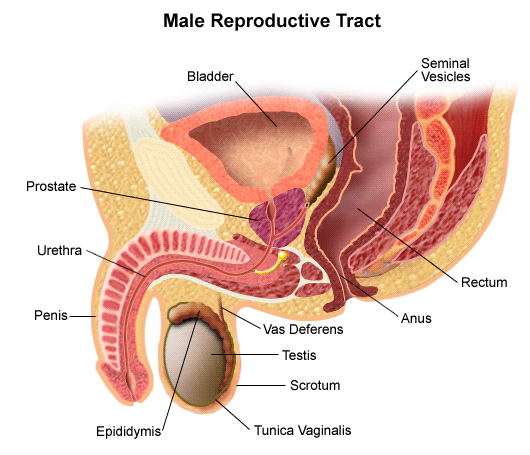Trans Perineal Biopsy of the Prostate (TPBP)
- What is the Prostate?
- Why do I need a biopsy of my prostate?
- What is a transperineal biopsy?
- What will happen before my biopsy?
- The procedure
- What can I expect after my biopsy?
- Top
What is the Prostate?
The prostate is a gland located at the base of the bladder. It surrounds the urethra and sits in front of the rectum. Urine passes through the prostatic urethra from the bladder. The prostate produces fluid to aid the passage of, and nourish, sperm.

Why do I need a biopsy of my prostate?
There are many medical conditions of the prostate. The two main diseases that affect the prostate gland are enlargement or cancer. The prostate gland enlarges and may cause obstruction to the flow of urine. This is called Benign Prostatic Hyperplasia (BPH). If you are suspected of having prostate cancer then your doctor may perform a transperineal biopsy.
What is a transperineal biopsy?
The surgeon will examine the prostate through the back passage (anus) before inserting the ultrasound probe into the rectum. This probe is as wide as a man’s thumb and approximately 4 inches long. In order to take samples (biopsies) of the prostate, a special grid is used so that all areas of the prostate can be included. The biopsy needles are inserted into the prostate through the skin of the perineum, guided by the ultrasound probe (pictured). After the biopsies have been done, a firm dressing will be applied to the perineum and held in place with a pair of disposable pants.
What will happen before my biopsy?
You will be admitted to hospital as a day case. You should fast for at least 6 hours prior to the procedure.
Continue to take your normal medications – you will be given instruction if you are required to stop any medications prior to the biopsy. Bowel preparation is not necessary.
You must notify Dr. Dixon Woon if you have recently been overseas or if you have had any diarrhoea in the weeks leading up to your prostate biopsy.
The procedure
A transperineal biopsy is performed under general anaesthetic.
Dr. Dixon Woon will take approximately 18-24 samples of tissue from six different sites in the prostate gland. The samples of tissue will be sent to pathology for examination.
At the same time as your biopsy Dr. Dixon Woon will perform a cystoscopy (a telescopic examination of the prostate, urethra and bladder). This is to image the internal anatomy of the urinary tract to check for any internal bladder or prostate problems and it provides information important for your subsequent treatment.
You will also be given intravenous antibiotics during the procedure.


What can I expect after my biopsy?
Most procedures have possible side effects. And, although the complications listed below are well-recognised, most patients do not suffer any problems.
- Blood in your urine for up to 10 days
- Blood in your semen for up to six weeks; this is harmless and poses no risk to you or any sexual partners
- Bruising in your perineal area
- Urinary tract infection
- Retention of urine (unability to urinate) needing a temporary catheter (usual a couple of nights)
- Haemorrhage (bleeding) preventing you from passing urine and a temporary catheter
- Blood infection (septicaemia) needing hospitalisation.
When you are discharged from hospital, you should:
- Be given advice about your recovery at home
- Ask when you can begin normal activities again, such as work, exercise, driving, housework and sex
- Ask when your follow-up will be
- Be sure that you know when you get the results
It is important that you:
- Relax at home for the first 48 hours after the biopsies
- Drink twice as much fluid as you would normally for the first 48 hours
- Maintain regular bowel function
If you feel unwell with fevers and sweats, or are unable to pass urine then you should contact the Urology Nurse 03 8415 1915, or Dr. Dixon Woon’s room 03 8415 1511, or out of hours Epworth Freemasons 03 9483 3383. If this is not possible and you feel very unwell you should present to the Emergency Department closest to you, or to the Epworth Emergency Department – 89 Bridge Road Richmond, 03 9426 6302.
Disclaimer: The information on this website is provided for your general information and is not a substitute for the specific advice of your treating doctor.

